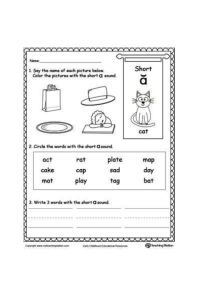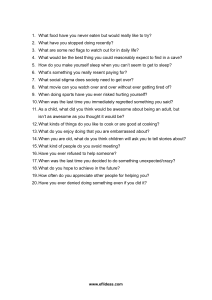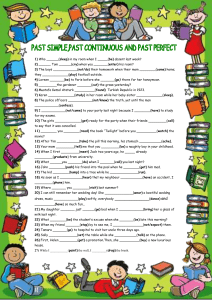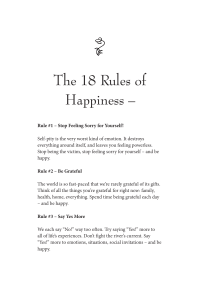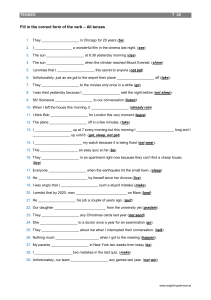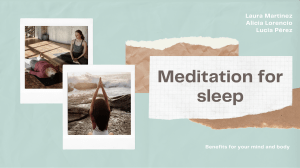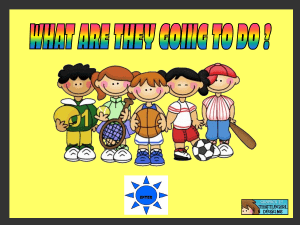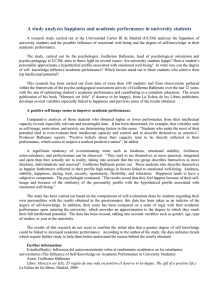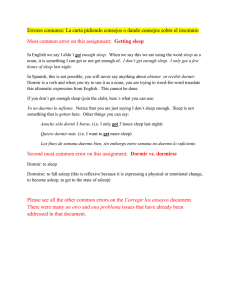Health Coursebook: Sleep, Longevity, and Happiness
Anuncio
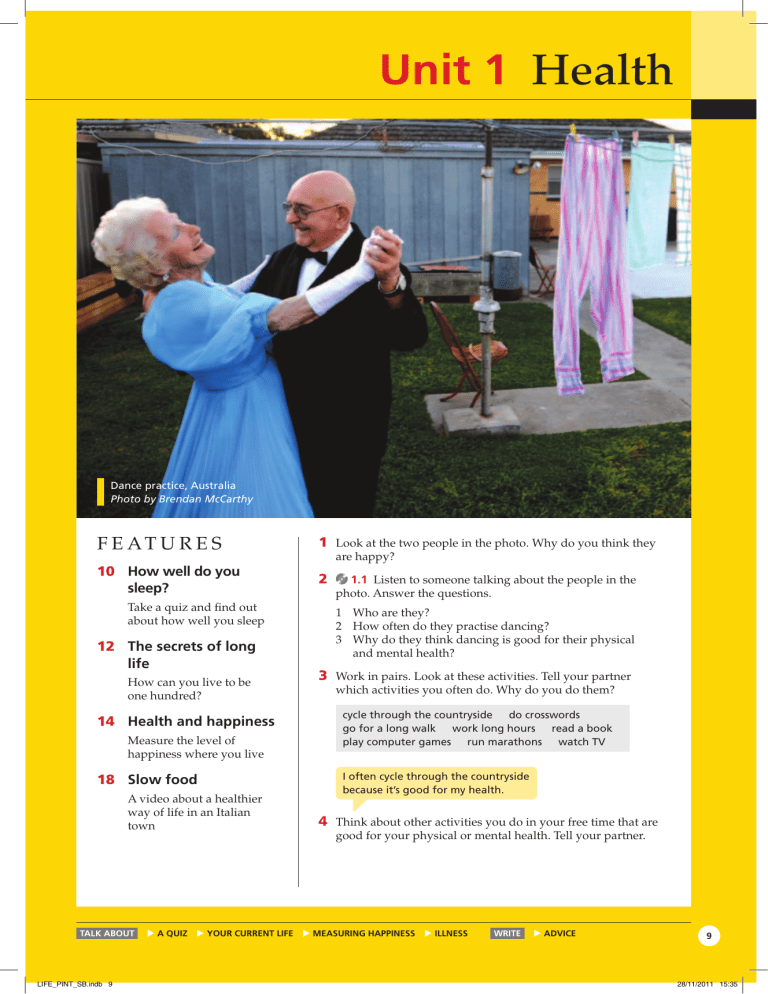
Unit 1 Health Dance practice, Australia Photo by Brendan McCarthy F E AT U R E S 1 Look at the two people in the photo. Why do you think they 10 How well do you sleep? 2 Take a quiz and find out about how well you sleep 12 The secrets of long life How can you live to be one hundred? 14 Health and happiness Measure the level of happiness where you live 18 Slow food A video about a healthier way of life in an Italian town TALK ABOUT LIFE_PINT_SB.indb 9 are happy? 1.1 Listen to someone talking about the people in the photo. Answer the questions. 1 Who are they? 2 How often do they practise dancing? 3 Why do they think dancing is good for their physical and mental health? 3 Work in pairs. Look at these activities. Tell your partner which activities you often do. Why do you do them? cycle through the countryside do crosswords go for a long walk work long hours read a book play computer games run marathons watch TV I often cycle through the countryside because it’s good for my health. 4 Think about other activities you do in your free time that are good for your physical or mental health. Tell your partner. A QUIZ YOUR CURRENT LIFE MEASURING HAPPINESS ILLNESS WRITE ADVICE 9 28/11/2011 15:35 reading and speaking the secrets of sleep • listening analysis of your answers • grammar present simple and adverbs of frequency • pronunciation /s /, /z / or /ɪz / • speaking and writing a quiz 1a How well do you sleep? Reading and speaking 1 Do you feel tired today? Why? / Why not? Grammar present simple and adverbs of frequency 2 Do the quiz below about sleep. Make a note of your 5 Match the sentences from the quiz (1–2) with answers. the uses of the present simple tense (a–b). Listening 1 Before bedtime, I often do some work. 2 I’m never tired at work. 3 1.2 Listen to a health expert talking about the quiz. Tick the characteristics which are true for each answer. a to talk about things that are always true b to talk about habits and routines People with mostly A answers: 1 You have regular routines. 2 You are hardly ever tired. PRESENT SIMPLE People with mostly B answers: 3 You wake up once or twice a night. 4 You need more sleep than other people. I/you/we/they don’t sleep he/she/it doesn’t sleep I/you/we/they sleep he/she/it sleeps Do you sleep ...? Does he sleep ...? People with mostly C answers: 5 You regularly work in the evening. 6 You don’t like sport. For further information and practice, see page 156. 4 Work in pairs. Compare your answers in the quiz. Quiz: Which type of person are you? Do you need to change your lifestyle? How well do you sleep? Question: 1 2 3 4 5 6 Q: Do you often feel tired? A No, I don’t often feel tired. B I sometimes feel tired after a long day at work. C All the time! I’m always ready for bed. Question: 1 2 3 4 5 6 Q: How many hours a night do you sleep? A Between seven and eight hours. B More than nine. I rarely stay up late. C Fewer than six. Question: 1 2 3 4 5 6 Q: Before bedtime, I often ... A watch TV or read a book. B do some exercise. C do some work. Question: 1 2 3 4 5 6 Q: At the weekend, I ... A usually sleep the same amount as any other day. B sometimes sleep for an hour or two extra. C always sleep until midday! I never get up early. Question: 1 2 3 4 5 6 Q: How often do you wake up in the middle of the night? A I never wake up before morning. B I rarely wake up more than once, and I usually fall asleep again quite quickly. C Two or three times a night. Question: 1 2 3 4 5 6 Q: Are you often sleepy during the day? A No, I’m never tired at work. B Sometimes, so I take a nap after lunch. After that I’m ready for work again. C Always! That’s because I work long hours and get home late. fall asleep /fɔ:l əˈsliːp/ start sleeping take a nap /teɪk ə næp/ a short sleep that you have during the day 10 LIFE_PINT_SB.indb 10 28/11/2011 15:35 Unit 1 Health 6 Look at the grammar box. Then complete the article about sleep with the present simple form of the verbs. 9 Complete this table with adverbs of frequency from the quiz in Exercise 2. 100% always usually The secrets of sleep 1 2 not often rarely 0% 3 10 Look at the position of the adverbs and expressions of frequency in the example sentences in the grammar box. Then choose the correct options to complete the rules (1–2). ADVERBS and EXPRESSIONS OF FREQUENCY Why 1 do we sleep (we / sleep)? From birth, we 2 (spend) a third of our lives asleep but scientists still 3 (not / know) exactly why. For further information and practice, see page 156. Why 4 (humans / have) problems sleeping? In modern society, many people 5 (not / get) the recommended seven or eight hours a night. We 6 (work) long 7 hours and we rarely (go) to bed at sunset. Why 8 She’s usually late for work. I often wake up at seven. How often do you wake up in the night? She wakes up two or three times a night. In the winter, we sleep longer. (we / sleep) differently? It 9 (depend) on the time of year and also our age. Teenagers always 10 (need) more sleep than adults. Lots of elderly people 11 (not / sleep) longer than four or five hours, but they often 12 (take) naps during the day. 7 Pronunciation /s /, /z / or /ɪz / 1 An adverb of frequency goes after / before the verb to be but it normally goes after / before the main verb. 2 An expression of frequency usually goes at the beginning / in the middle or at the end of a sentence. 11 Work in pairs. Ask and answer questions about these things. Use an adverb or expression of frequency in your answers. do exercise take public transport eat out in restaurants do gardening play board games check your emails How often do you do exercise? 1.3 Listen to the ending of these verbs. Write /s/, /z/ or /ɪz/. Then listen again and repeat. 1 2 3 4 feels /z/ needs watches sleeps 5 6 7 8 goes dances does works 12 Work in groups. Prepare a How healthy are you? 1 What time do people normally get up in your country? How late do they stay up? Do they ever take a nap in the afternoon? 2 How does this change during the year? Do people sleep longer in the summer or in the winter? LIFE_PINT_SB.indb 11 A QUIZ YOUR CURRENT LIFE Two or three times a week. Speaking and writing 8 Discuss the questions. TALK ABOUT be late for work read a novel in the bath be in a bad mood go on holiday be busy at weekends be stressed at work quiz for another group. Start each question with How often …? Are you often …? or Do you ever …? and offer three choices of answer (A, B or C). 13 When you are ready, join another group and ask the questions in your quiz. Afterwards, tell the class about their answers. Do you think the other group is very healthy? MEASURING HAPPINESS ILLNESS WRITE ADVICE 11 28/11/2011 15:35 reading the island of Okinawa • vocabulary do, go or play • listening in search of a long life • grammar present simple and present continuous • speaking your current life 1b The secrets of long life Reading Vocabulary do, go or play 1 Who is the oldest person you 4 Complete the table with activities from the article in Exercise 2. know? How old are they? How healthy is their lifestyle? do go play fishing 2 Read the article below. Answer the questions. 1 Why are the people of Okinawa famous? 2 What are the reasons for their good health? 3 Which of the reasons for good health in the article are true for your life? Tell your partner. 5 Add these activities to the table in Exercise 4. Use your dictionary to help you, if necessary. Then think of one more activity for each verb. cards tennis hiking homework nothing running shopping the piano yoga football karate surfing WORDBUILDING verb + noun collocations We can only use certain nouns with certain verbs. These are called collocations. For example, go fishing but not do fishing or play fishing. For further information and practice, see Workbook page 11. The Secrets of The island of Okinawa in Japan has some of the oldest people in the world. It’s famous for its high number of centenarians – men and women who live beyond 100 years of age. There have been many scientific studies of their lifestyle and you can even buy cookery books based on their diets. Some of the reasons for their good health are that they … • • • • • • go fishing and eat what they catch. regularly do gardening and grow their own fruit and vegetables. go cycling and never drive when they can walk. often spend time with friends. They meet at people’s houses and play games. rarely buy food from a supermarket. do regular exercise, go swimming and lead active lives. 12 LIFE_PINT_SB.indb 12 28/11/2011 15:35 Unit 1 Health Listening 6 9 The three other sentences in Exercise 8 use 1.4 Listen to a radio interview with David McLain, an explorer and journalist. Answer the questions. 1 What does David want to know? 2 Why is he in Sardinia? 7 1.4 Listen again. Are the sentences true (T) or false (F)? 1 David McLain is travelling to different countries. 2 He’s talking to the radio presenter in the studio. 3 Men don’t live the same number of years as women on Sardinia. 4 Sardinian families often eat together. 5 David thinks Sardinia is less stressful than other countries. 6 Younger people are eating more unhealthy food and they aren’t getting much exercise. the present continuous tense. How do you form the tense? Match the three sentences to the uses (a–c). a to talk about things happening at the moment of speaking b to talk about things happening around now but not necessarily at the moment of speaking c to talk about current trends and changing situations PRESENT CONTINUOUS I am speaking you/we/they are speaking he/she/it is speaking I’m not travelling you/we/they aren’t travelling he/she/it isn’t travelling Am I moving? Are you/we/they moving? Is he/she/it moving? For further information and practice, see page 156. 10 Complete the sentences with the present simple or present continuous form of these verbs. check not / do not / eat go learn play read spend 1 We ’re learning a new language at the moment. 2 My friends and I often time at each other’s houses. 3 One moment! I my emails and then I’m ready to go. 4 How often you to the gym? 5 I a really interesting book at the moment. 6 Currently, a friend of mine any sweets and he says he feels healthier. 7 I’m nearly eighty but I any exercise! 8 Which computer game you ? It looks fun. Grammar present simple and present continuous 8 Look at the five sentences from the interview in Exercise 6. Which two sentences use the present simple tense? Why? 1 2 2 4 He’s currently travelling to places and regions. He’s speaking to us right now on the phone. Men live the same amount of time as women. Every Sunday the whole family meets and they eat a huge meal together. 5 Young people are moving to the city so they are doing less exercise because of their lifestyle. TALK ABOUT LIFE_PINT_SB.indb 13 A QUIZ YOUR CURRENT LIFE Speaking 11 Work in pairs. Take turns to ask and answer the questions. Use the present simple and present continuous tense in your answers. 1 What’s your typical working day? Are you working on anything new at the moment? 2 How do you spend your free time? Are you getting much exercise? 3 Do you often read novels? Are you reading anything interesting at the moment? 4 Where do you normally go on holiday? Are you planning your holidays for this year? 5 Do you speak any other languages? Are you learning any new languages? MEASURING HAPPINESS ILLNESS WRITE ADVICE 13 28/11/2011 15:35 speaking feeling happy • critical thinking the main argument • reading happy and healthy • word focus feel • speaking measuring happiness 1c Health and happiness Speaking Word focus feel 1 Which of these things make you feel happy? 4 Look at the sentences (1–4) from the article. Match Order them from 1 to 5 (1 = most happy). Compare with your partner. • • • • • Sleeping a long time Having money Relaxing on holiday Going out with friends Doing exercise Critical thinking the main argument 2 Read the article on page 15. Which of the sentences (1–3) is the best summary of the main argument? 1 Happiness improves our health. 2 Denmark is the happiest country in the world. 3 There are different ways to measure happiness. Reading 3 Choose the correct answer (a–c) for the questions, according to the information in the article. 1 How did the King of Bhutan measure the country’s development? a by money b by health c by happiness 2 Which is easier to measure? a happiness b health c sickness and ill health 3 Why was Iceland number one in a survey? a for its money b for its health c for its happiness 4 How did researchers measure happiness in 155 countries? a with answers to questions b by looking at people’s faces c by measuring the number of sick people 5 What do visitors to Krikortz’s website click on? a questions b faces c numbers 6 How many categories does Krikortz have for measuring happiness? a three b five c seven 7 What colour are the lights on the building when Stockholm is happy? a red b green c purple feel in each sentence with the uses (a–d). 1 It’s also easy to measure how many people feel ill or unhealthy in a country. 2 Denmark feels happier than other countries. 3 Krikortz feels that there are other ways of measuring happiness. 4 The coloured lights are also useful if you feel like visiting the city. a b c d to give an opinion to talk about an emotion to talk about physical illness to talk about wanting something or wanting to do something 5 Match the questions (1–3) to the responses (a–c). 1 How do you feel today? 2 What do you feel about Krikortz’s project? 3 Do you feel like going for a coffee after the class? a Fine, thanks. How about you? b Yes, I’d like to. c I’m not sure. It’s quite interesting I suppose. 6 Work in pairs. Take turns to ask the questions in Exercise 6. Answer with your own words. Speaking 7 Work in groups. Discuss the questions. 1 In paragraph 1, the King of Bhutan talks about ‘Gross National Happiness’. How happy do you think your country is? Give reasons for your answer. 2 In paragraph 2, a doctor said, ‘Happy people generally don’t get sick.’ How much do you agree with this opinion? 3 In paragraph 3 and 4, there are different questions and categories for measuring happiness. Which do you think are useful for measuring happiness? Which are not very useful? 8 Work in the same group. Make a list of five categories for measuring happiness (e.g. money, sleep). Then everyone in the group gives a score for each of the categories (1= very happy, 2 = happy, 3 = OK, 4 = not very happy). How happy is your group? Present your categories and result to the class. 14 LIFE_PINT_SB.indb 14 28/11/2011 15:35 measuring Unit 1 Health HEALTH AND HAPPINESS The small country of Bhutan in the Himalayan mountains is over one thousand years old. In the past it was a poor country and not many people visited it. But nowadays, it is becoming more and more popular with tourists. Medicine and health is improving and its economy is growing. King Jigme Singye Wangchuck, the king of Bhutan until 2006, talked about his country’s ‘Gross National Happiness’. In other words, he thought happiness is the way to measure the country’s development. So does happiness equal money and good health? Not according to the artist Erik Krikortz. He feels that there are other ways of measuring happiness. Krikortz has a website and visitors click on different happy or sad faces to comment on how well they sleep, their family and friends, their level of stress, their inspiration and their physical activity. When you finish, his website adds the results for each area and it gives you a final result for your happiness. But how do you measure happiness? Perhaps health is the best way because a famous doctor once said, ‘Happy people generally don’t get sick.’ It’s also easy to measure how many people feel ill or unhealthy in a country. For example, one survey says Iceland is the ‘healthiest country in the world’ because men and women live a long time there, the air is very clean and there are more doctors available per person than anywhere else in the world. In his home city of Stockholm, Krikortz also shows the results of his survey as different coloured lights on the side of a large building in the city. For example, red means the people of Stockholm are very happy, green is OK and purple means many people are sad. ‘A lot of people look at the building every day and see how “we” are,’ Krikortz says. The coloured lights are also useful if you feel like visiting the city. For example, if the lights are red, you know the locals are feeling happy! However, there was another survey of the happiest countries in the world and Iceland was not near the top. The questions on this survey included: How much do you earn? How healthy are you? How safe do you feel? After visiting 155 different countries, the researchers decided that Denmark feels happier than other countries. inspiration (n) /ˌɪnspəˈreɪʃn/ a feeling that makes you want to do something or gives you exciting new ideas TALK ABOUT LIFE_PINT_SB.indb 15 A QUIZ YOUR CURRENT LIFE MEASURING HAPPINESS ILLNESS WRITE ADVICE 15 28/11/2011 15:35 vocabulary medical problems • pronunciation sound and spelling • real life talking about illness 1d At the doctor’s Vocabulary medical problems 3 What do you do when you have the medical problems in Exercise 1? Categorise them into the three groups. Then compare with your partner. 1 Look at the pictures. Match the people (1–8) with the medical problems (a–h). 1 1 I go to bed. 2 I take medicine or pills. 3 I go to the pharmacy or see my doctor. 3 Real life talking about illness 2 4 4 5 6 1.6 Listen to two conversations, one at a pharmacy and the other at a doctor’s. Write the number of the conversation (1 or 2) next to the person’s medical problems and medical advice they receive. Medical problem Medical advice sore throat 1 bad cough runny nose earache feel sick temperature take this medicine twice a day 1 go to bed drink hot water with honey and lemon take one pill twice a day buy a box of tissues drink lots of water 7 8 a b c d e f g h I’ve got a headache. I’ve got back ache. I’ve got a runny nose. I’ve got earache. I’ve got stomach ache. I’ve got a temperature. I’ve got a sore throat. I’ve got a bad cough. 2 Pronunciation sound and spelling a Many English words have the same vowel sounds but different spellings. Match the words with the same vowel sounds. 1 2 3 4 5 6 b 16 head sore throat cough ache ear wake saw off note here bed 1.5 Listen and check your answers. Then listen again and repeat. TALK ABOUT LIFE_PINT_SB.indb 16 5 1.6 Listen again and complete the sentences. Then match them with the correct section in the box. 1 2 3 4 5 6 7 8 I a sore throat. You take this medicine. It’s a sore throat. You a box of tissues. If you still feel ill in a few days, see a Let me have a . Do you sick? Let me check your . . TALKING ABOUT ILLNESS Asking and talking about illness I don’t feel very well. I feel sick / ill. Have you got a temperature? How do you feel? Giving advice Try drinking hot water with lemon. You need to take one of these. Drink lots of water. 6 Work in pairs. Practise this conversation. Then change roles and repeat the conversation. Student A: You have a medical problem. (Choose one from Exercise 1.) Student B: You are a pharmacist. Ask how Student A feels and give advice. A QUIZ YOUR CURRENT LIFE MEASURING HAPPINESS ILLNESS WRITE ADVICE 28/11/2011 15:35 Writing online advice • Writing skill conjunctions (and, or, so, because, but) Unit 1 Health 1e Medical advice online Writing online advice 3 Writing skill conjunctions 1 Many people look for medical advice on the internet before they visit their doctor. Do you think this is a good idea? Why? / Why not? (and, or, so, because, but) a Look at the highlighted connectors in the forum in Exercise 2. Then complete the rules with those words. 2 Look at the advice forum on a website. Answer the questions. 1 What medical problem has each person got? 2 Do you think the doctor gives them good advice? 3 Can you think of any more advice for each person? 1 We use and to connect two words or parts of a sentence. 2 We use to introduce an idea that is different. 3 We use to say ‘with the result that.’ 4 We use to explain the reason. 5 We use to connect an alternative word or idea. www.askdoctorjoe.com Home Symptom checker Advice forum Petra: I returned from a walking holiday in the Himalayas a week ago and now I feel sick. Do you think it’s from the trip? Dr Joe: It could be from the holiday or it could be something you ate at home. But you should visit your doctor or hospital immediately! Seth: Hi! I often have problems sleeping at night so I’m tired all the time. Have you got any advice? Dr Joe: Sorry to hear this. Do you drink coffee before bed? It has caffeine and this often stops people sleeping. Try drinking herbal tea or a glass of warm milk because these drinks don’t have any caffeine. Sabine: I’m worried about my health. I like doing exercise, but I spend all day working in front of a computer. What can I do? Dr Joe: How do you travel to work? You could go by bicycle. It’s good for your health AND it saves you money. Accidents and fir TALK ABOUT LIFE_PINT_SB.indb 17 A QUIZ 1 You need to do more eat healthy exercise food. 2 Jogging is healthy, eating chocolate is nicer! 3 You could try cycling go walking if you don’t have a bicycle. 4 Fruit and vegetables are good for you they are full of vitamins. 5 Fruit and vegetables are full of vitamins, they are good for you. Health and well Common illnesses News Sports and fitne Travel and imm MORE FRO4 Services Case studies Partnership Research About Board FREE advice, 24 hrs the connectors in Exercise 3. Eyes Latest news www.askdoctorjoe.com b Complete the sentences with Diet and nutritio Members Imagine you want advice from the forum. Choose a medical problem. Then write a message to Doctor Joe and ask for advice. 5 Exchange your message with your partner. Imagine you are Doctor Joe. Write a reply with two or three pieces of good advice. Remember to use connectors. Statistics Careers Contact us YOUR CURRENT LIFE MEASURING HAPPINESS ILLNESS WRITE ADVICE 17 28/11/2011 15:35 1f Slow food A place where time is slower. 18 LIFE_PINT_SB.indb 18 28/11/2011 15:35 Unit 1 Health Before you watch After you watch 1 Work in groups. Look at the title of the video and 6 Match the people (1–4) with what they say (a–d). the photo. Discuss the questions. 1 2 3 4 What do you think ‘slow food’ is? How do you think the people in the photo feel? What do you think the photo caption means? What do you think the video is about? 2 Tick the things you think will be in this video. countryside farmers and people making food fast food restaurants lots of cars a modern city relaxed people enjoying food While you watch 1 2 3 4 a the narrator Salvatore Toscano Greve’s mayor the cheese maker Our aim is to keep Greve the same. We want to keep Greve and all the other slow cities special. b It’s about taking more time so you are more calm and relaxed. c In the mountains of Pistoia, in northern Tuscany, farmers produce pecorino cheese. d Not everyone knows about our product. But now the slow food movement means people know about us. 7 Roleplay a conversation with Salvatore Toscano 3 Watch the video and check your ideas from Work in pairs. 4 Watch the video again. Are these sentences true (T) Student A: You are Salvatore Toscano. Read the questions below and make notes about yourself. Then ask your customer about his life. Exercise 2. or false (F)? 1 2 3 4 5 6 7 8 Chianti is a region in Spain. Four thousand people live in Greve. Greve is part of the Slow Cities League. Salvatore Toscano runs an American-style restaurant. His restaurant is in Greve. Farmers make pecorino cheese from cows’ milk. Pecorino cheese is not very popular nowadays. Greve wants to escape from the modern world. 5 Watch the video again. Answer these questions. 1 What is Greve famous for? 2 How many cities are in the Slow Cities League? 3 What is the purpose of the Slow Cities League? 4 How many members does the slow food movement have? 5 Why is pecorino cheese popular again? 6 What can you find everywhere in the world? • Why do you like Greve? • What is it like living in Greve? • Do you enjoy your job? Student B: You are a customer in Salvatore Toscano’s restaurant. You come from a large busy city. Read the questions below and make notes about yourself. Then ask Salvatore about his life in Greve. • • • • What’s your name? What’s your job? Do you like visiting Greve? Why? Do you want to live somewhere like Greve? Act out the conversation. Compare your lives. Then change roles and repeat the conversation. 8 Read what the man says at the end of the video. Answer the questions. From Singapore to Macao, in New York, in Rome, you always find the same pizza, the same hamburgers. Slow food doesn’t want this. 1 Do you agree? 2 Do you think slow food is a good idea? 9 Work in pairs. Discuss these questions. 1 Would you like to live in Greve? Why? / Why not? 2 Do you live a quiet life or do you live in the fast lane? In what ways? die out (v) /daɪ ˈaʊt/ disappear mayor (n) /ˈmeɪə/ the head of the administration of a town vineyard (n) /ˈvɪnjɑ:d/ a place where grapes grow worldwide (adv) /wɜ:ldˈwaɪd/ all over the world 19 LIFE_PINT_SB.indb 19 28/11/2011 15:35 UNIT 1 REVIEW Grammar Vocabulary 1 Work in pairs. Look at the photo. Where are the 4 Which words can follow the verb in CAPITAL man and the elephant? What are they doing? 2 Choose the correct forms to complete the text about the man in Exercise 1. letters? Delete the incorrect word. 1 2 3 4 FEEL DO PLAY GO tired, happy, ache, sick exercise, housework, relaxing, yoga golf, swimming, games, tennis marathon, racing, hiking, driving 5 Work in pairs. How do you feel about your new English course? Do you feel worried about anything? (Tell your teacher if you are.) I CAN talk about leisure activities say how I feel Real life 6 Choose the correct words to complete the conversation between two friends. A: B: A: B: A: How do / Do you feel? Not very 2 well / ill. I’ve got a 3 pain / sore throat. 4 Do you feel / Have you got a high temperature? I don’t know. I feel a bit hot. 5 Try / You need drinking some honey and lemon in hot water. B: Good idea. A: But 6 you should / it’s a good idea also see your doctor. 1 7 Work in pairs. Practise two similar conversations. Conversation 1: Student A has got a headache. Student B gives advice. Every day, Nazroo 1 drives / is driving elephants for a living, but, as you can see here, 2 he takes / he’s taking his favourite elephant, Rajan, for a swim. In this photo 3 they swim / they’re swimming in the sea around Andaman Island. Sometimes they 4 like / are liking to relax this way after a hard day. I was surprised because Rajan 5 doesn’t seem / isn’t seeming worried about being under the water. I guess it feels good after a long, hot day at work. 3 Work in pairs. How often do Nazroo and Rajan go swimming? How often do you go swimming? How do you like to relax? I CAN talk about regular actions and events using the present simple Conversation 2: Student B has got stomach ache. Student A gives advice. I CAN talk about feeling ill give advice Speaking 8 Complete these questions to ask someone about their everyday habits and interests. 1 2 3 4 5 Do you often play …? How often do you go …? Do you ever …? What are you -ing …? Why do you …? 9 Work in pairs. Ask and answer your questions from Exercise 8. describe actions in progress (now or around now) using the present continuous ask and answer questions with How often …? 20 LIFE_PINT_SB.indb 20 28/11/2011 15:36
